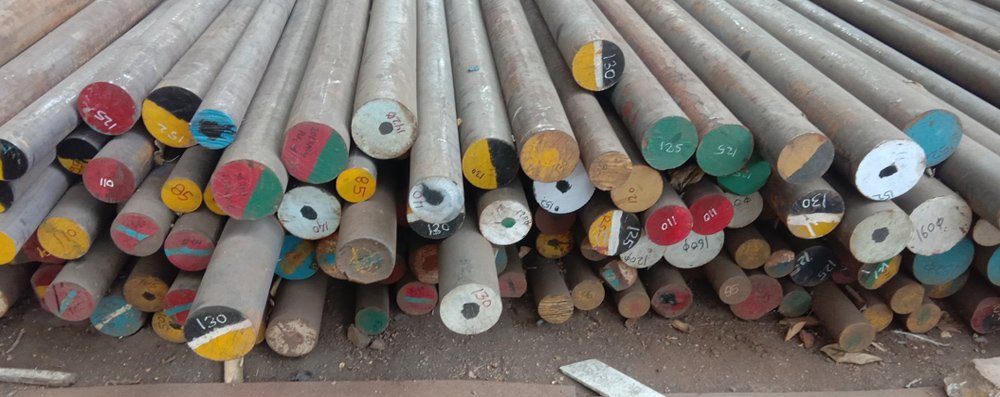Introduction
EN31 is a high carbon, high chromium alloy steel, widely recognized for its exceptional strength, hardness, and wear resistance. Also comparable to AISI 52100, EN31 offers excellent toughness and abrasion resistance, making it highly suitable for bearing applications and precision mechanical parts requiring high surface hardness. Due to its high carbon and chromium content, it achieves high hardness through heat treatment and is extensively used in engineering and tooling industries.
Uses/Applications:
EN31 is commonly used in applications where high hardness, wear resistance, and load-bearing capabilities are essential.
- Ball and roller bearings
- Automotive components (axles, crankshafts, gears, camshafts)
- High precision machine parts
- Taps and dies
- Tool holders
- Shafts and spindles
- Punches and gauges
- Knives and cutting tools
- Press tools
- Valves and valve parts
Properties of the Grade:
- High surface hardness after heat treatment
- Excellent wear resistance and toughness
- High compressive strength
- Good dimensional stability
- Moderate corrosion resistance (when compared to non-stainless steels)
- Capable of achieving high tensile strength
- Good fatigue strength
Chemical Composition:
| Element | Content (%) |
| Carbon (C) | 0.90 – 1.20 |
| Chromium (Cr) | 1.00 – 1.60 |
| Manganese (Mn) | 0.30 – 0.75 |
| Silicon (Si) | 0.10 – 0.35 |
| Sulphur (S) | ≤ 0.025 |
| Phosphorus (P) | ≤ 0.025 |
The high carbon and chromium content provide EN31 with its characteristic strength and wear resistance.
Mechanical Properties:
(Typical values after heat treatment)
| Property | Typical Value |
| Hardness (Annealed) | ~ 250 HB |
| Hardness (Hardened) | 60 – 66 HRC |
| Tensile Strength | 850 – 1000 MPa (Annealed) |
| Yield Strength | ~ 650 MPa (Annealed) |
| Elongation | ~ 8 – 10% |
| Impact Strength | Moderate |
Physical Properties:
| Property | Typical Value |
| Density | ~ 7.81 g/cm³ |
| Modulus of Elasticity (E) | ~ 210 GPa |
| Thermal Conductivity | ~ 46.6 W/m·K |
| Specific Heat Capacity | ~ 460 J/kg·K |
| Coefficient of Thermal Expansion | ~ 10.4 × 10⁻⁶ /°C |
Forging:
Forging Temperature Range: 850°C – 1150°C
Procedure:
- Preheat slowly and uniformly.
- Start forging at 1150°C and do not forge below 850°C.
- After forging, parts should be cooled slowly, preferably in a furnace.
Post-forging annealing is recommended to relieve stresses.
Heat Treatment:
- Annealing:
- Heat slowly to 800°C – 850°C.
- Hold at temperature.
- Cool in the furnace.
- Resulting hardness: ~ 250 HB.
- Hardening:
- Preheat at 600°C – 650°C.
- Austenitize at 780°C – 820°C.
- Oil quench for best results.
- Tempering:
- Temper immediately after quenching.
- Typical tempering temperatures: 150°C – 200°C depending on the hardness requirement.
- Tempering reduces internal stresses and increases toughness.
Dimensional Tolerances:
- Supplied in hot rolled, forged, or ground condition.
- Bright bars and precision ground bars are available with tolerances:
- ISO h9, h10 or customized on request.
- Close dimensional tolerances can be achieved after machining and grinding post-heat treatment.
Machinability:
- EN31 offers good machinability when annealed.
- Machining in hardened condition is challenging and usually requires carbide tooling.
- Recommended to use cutting fluids for cooling and lubrication during machining to extend tool life.
Corrosion Resistance:
- EN31 is not a corrosion-resistant steel.
- It can rust in moist or corrosive environments if not properly protected.
- Protective coatings (oil, plating, etc.) or surface treatments are recommended for corrosion-prone applications.
Weldability:
Poor weldability due to high carbon content.
Welding is generally not recommended.
If welding must be performed:
- Preheating to 250°C – 300°C is essential.
- Post-weld stress relief heat treatment is necessary.
Available Form:
EN31 steel is available in various forms, including:
- Round Bars
- Square Bars
- Flat Bars
- Forged Blocks
- Plates
- Sheets
It is supplied mostly in the annealed condition to facilitate machining.
Conclusion:
EN31 steel (comparable to AISI 52100) is a versatile, high carbon chromium alloy steel offering a unique blend of hardness, strength, wear resistance, and toughness. Its capability to maintain high hardness after heat treatment makes it particularly suitable for manufacturing high-precision, high-load, and wear-resistant components. However, it requires careful handling regarding corrosion protection and welding operations. Overall, EN31 remains one of the most preferred materials for bearing parts, high-precision tools, and automotive applications.
Related Products : 16MnCr5, EN19, 42CrMo4, 20MnCr5, EN353, EN31, EN24, EN47, EN41B, SAE4140, SAE52100, SAE 8620, SCM420, EN36C, Maps


